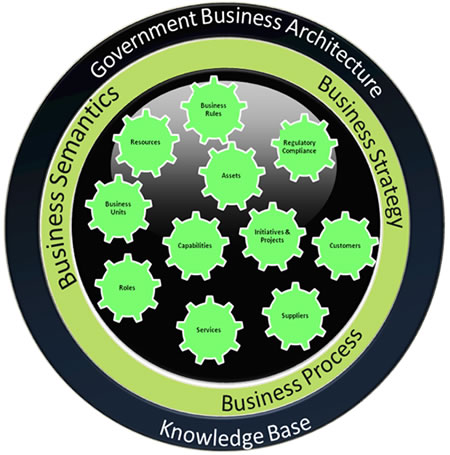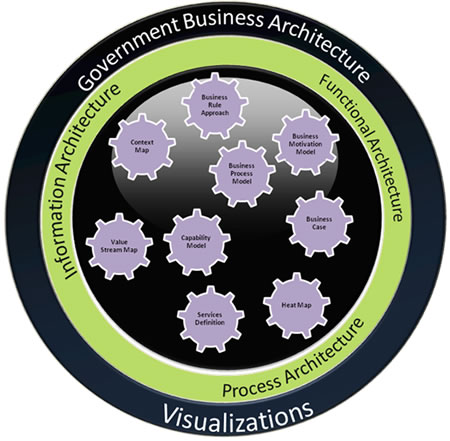Most articles written about Business Architecture reflect upon an organisations design within a private sector environment whereby the driving force in deciding the organisations direction is profit and loss. Profitability can more or less be measured by cost of company operations and optimisation of transactional and support activities against revenue generated from customer needs. Other measures such as customer satisfaction, quality, and price of competitor products and services all affect the organisations design, direction, operation and optimisation.
Government Business Architecture however reflects upon an organisations design within an administrative environment whereby the driving force in deciding the organisations direction is a mission that is likely to be derived from legislation. This analogy is not perfect if you analyse it, but try to think of Government as having a mission to educate, protect, and serve. Therefore, the mission can be more or less measured by cost of operations against various public services performed according to law. There are various forms of measures, such as accurate recording of financial data, archiving of information, continuous update of information and personal details for purposes of government compliance and audit, provision of services for public and community events, and tabling of reports to parliament etc.
The difference between private sector and government direction, results in changes by which the driving forces are defined and measured. This in turn defines the method by which the operations are defined into a transactional and support activity according to the mission and ultimately the legislation. This is reflected in the manner in which the government department’s missions, or sometimes called vision, are collated and communicated via the government business architecture (GBA). The GBA can be used to assist government officials in making decisions and deciding on courses of action that will realise their strategy in providing a public service. To this end the Object Management Group defines Business Architecture as “A blueprint of the enterprise that provides a common understanding of the organization and is used to align strategic objectives and tactical demands.” Under this definition the GBA should align process and practices that adhere to legislative requirements, in the most cost effective manner for achieving their defined mission. Using the GBA the department can achieve a single consistent view of the business from which all their decisions can be ratified.
The Usefulness of Business Architecture for Government Department’s
All Government Department’s perform a number of functions to complete their mission. In order to achieve success in the performance of these functions a single view or blueprint of the department is required. This view or visualization encompasses processes, people, assets, strategies, goals et al. The GBA referred to here is in fact, the creation of these visualizations.
The visualizations provide the framework that supports the achievement of the mission. The mission will always drive the strategy. Therefore the business strategy may be seen as an overriding objective for the purpose of improving the manner in which operations and transaction are performed by the department. GBA can be used to depict how the mission and strategy are implemented into the operations and transactions as well as supporting management in making decisions.
In the course of driving the strategy through the operations and transactions within the department certain business changes may need to be made. These changes can affect the whole department and need to be enabled and managed across the government department’s daily operations. The main business changes or scenarios that would be required by a government department (a subset that has been published from The OMG, Business Architecture Special Interest Group) are listed below:
- Business Unit Consolidation,
- Change Management,
- Regulatory Compliance
- Operational Cost Reduction
- Federated Architecture Alignment
It is with large cross functional business changes such as these that the GBA provides management with relevant information, potential impacts and a single clear view of the department. This information can assist managers in making defensible decisions that take the entire department into account.
A GBA Framework
GBA can be seen as a discipline that provides the department with a plan of its current capabilities, key drivers and current functions. The GBA can map out the future capability needs and adapt them to business units and processes in order to assist the department in reaching its defined strategic objectives. In addition, the GBA can be used to act as the bridge between the business model of the department on one side and the business operations that implement these needs on the other. The models used to communicate the GBA to the department are derived by analysing and defining various organisational elements. The framework below depicts the GBA Knowledge Base.

The corresponding framework, the Business Visualization, depicts the models and views that can be derived from the knowledge base:

Conclusion
There is a strong case for creating and maintaining a GBA within government departments. This information can be used to identify the impacts of predicted changes, can provide the assurance that legislation is being adhered to and assist with maintaining operationally effective services in a cost effective manner. The main constructs used in developing a GBA focus on mission, services and legislation.
However, in order for GBA to assist the government departments in achieving their mission, managing operational costs and increasing operation efficiencies the knowledgebase, visualizations and scenarios need to be strategically aligned and maintained.
References
- Business Architecture Scenarios, August 10 2010, Object Management Group, William Urich, Neil McWhorter.
- The MODAF Strategic Views (StV) Viewpoint, November 2008, http://www.mod.uk/, Ministry of Defence
- White Paper on Business Architecture Standards, August 200, William Urich, Neil McWhorter
- Business Architecture: Creation and Application, October 2009, http://www.BMPinstitute.org, Geoffrey Balmes, Sr.
- Inherently Governmental Functions: Government Department vs. Private Sector Management, Balanced Scorecard institute
- A Culture of Effective Information Handling, Australian Government departments
- About Business Architecture, Business Architecture Association
- What is the business of Business Architecture? Andrew Guitarte, Chairman, Business Architecture Society

















